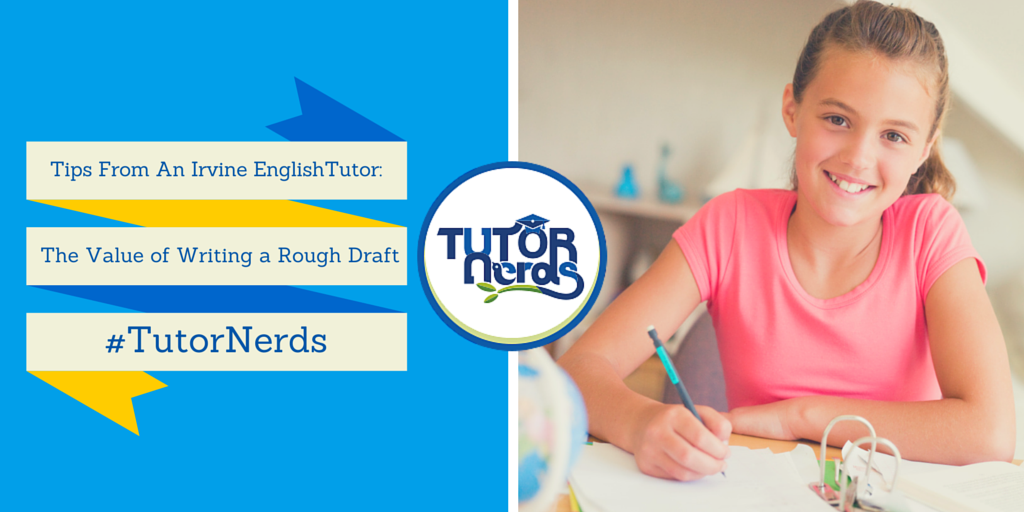Tips From an Irvine English Tutor: The Value of Writing a Rough Draft


Many students feel it’s not important to write a high-quality rough draft, especially if they simply get a check or credit from their teacher for completing a certain number of paragraphs. If a teacher happens to grade primarily on the final draft, students may view the rough draft as unimportant.
Additionally, students who don’t particularly enjoy research and writing may be tempted to think of the rough draft as something they can skip over and fix later on. However, the rough draft serves a higher purpose than simply to receive a credit for completion, rather it teaches valuable writing, research, and time management skills that will help younger students now and later on in high school and college – struggling in English? Summer is the perfect time to work with an Irvine English tutor to improve writing skills.
The point of a rough draft is to teach students that high quality writing takes more than one try. All professional writers and college level English majors write at least one, if not several, rough drafts before handing in a final version. Writing multiple drafts also teaches younger students that writing is a step by step process. First, they need to do research and gather content in the form of an outline. Second they need to get their thoughts down on paper and formulate content in a well organized manner. Third, they need to edit and proofread for common grammar and punctuation errors. Students who understand that they are not able to complete a well written English assignment in one step tend to receive higher grades all the way from elementary school through the end of college (READ: “Five Tips for Success in English Class”).
Teachers will often make the rough draft due a few days before the final draft is due to help students learn to manage their time effectively. Students often avoid an assignment they’re not excited about, forcing them to stay up well past midnight to finish the assignment due the next morning. This nearly always results in a bad grade, a poorly written essay, and virtually no learning on the part of the student. However, students who take the rough draft seriously will be in a position where they only have to fix minor content or grammar changes before the final draft is due. Although some students may disagree, the teacher is doing them a huge favor by allowing them to hand in a rough draft ahead of time.
Writing a rough draft will help younger children learn how to manage long term assignments when they get into their college prep years and study at university. Students who are taking AP classes or who are living full-time on a college campus, will have to cope with long-range due dates (meaning they have three weeks to complete large amounts of work as opposed to one afternoon to finish a short-term assignment). The completion of a rough draft is preparation for these types of long-term assignments that become the bulk of an older student’s education (READ: “Literature 101: Surviving Character Analysis”).
The rough draft also has a practical purpose. The English language is complicated. Many English grammar and punctuation rules have exceptions that need to be memorized and there are various vocab words that need to be learned. Writing a rough draft allows students to focus on the content, reading, or research required and get their thoughts down on paper before they attempt heavy editing and proofreading. If necessary, students can work with their tutor to develop better flow, transition, grammar, and sentence structure. If asked, many teachers are willing to provide suggestions as to where a transition sentence should appear, how many grammar edits are needed, or if the length of the current draft is appropriate. However, students need to take the initiative to write a rough draft and ask their teacher about what they can improve upon (READ: “5 Reasons Students Should Blog”).
Bottom line
Although it’s tempting to write a subpar first draft, students are only cheating themselves out of valuable feedback from their teacher. The rough draft is the student’s opportunity to learn more about the English language, manage their time, and fix any mistakes needed in order to get their best effort grade.
100% Satisfaction Guarantee
You’ll love your tutor, or you don’t pay.

We will evaluate your situation and answer any questions. We will then individually match you with one of our tutors. Your tutor will recommend the best strategies for you based on your goals. You’ll work with the same tutor ongoing and you can schedule directly with your tutor.
100% Satisfaction Guarantee – You’ll love your tutor, or you don’t pay
| Cookie | Duration | Description |
|---|---|---|
| cookielawinfo-checkbox-analytics | 11 months | This cookie is set by GDPR Cookie Consent plugin. The cookie is used to store the user consent for the cookies in the category "Analytics". |
| cookielawinfo-checkbox-functional | 11 months | The cookie is set by GDPR cookie consent to record the user consent for the cookies in the category "Functional". |
| cookielawinfo-checkbox-necessary | 11 months | This cookie is set by GDPR Cookie Consent plugin. The cookies is used to store the user consent for the cookies in the category "Necessary". |
| cookielawinfo-checkbox-others | 11 months | This cookie is set by GDPR Cookie Consent plugin. The cookie is used to store the user consent for the cookies in the category "Other. |
| cookielawinfo-checkbox-performance | 11 months | This cookie is set by GDPR Cookie Consent plugin. The cookie is used to store the user consent for the cookies in the category "Performance". |
| viewed_cookie_policy | 11 months | The cookie is set by the GDPR Cookie Consent plugin and is used to store whether or not user has consented to the use of cookies. It does not store any personal data. |

